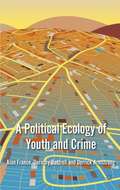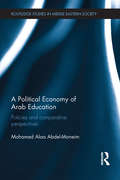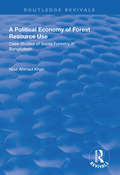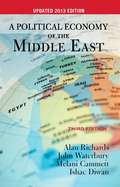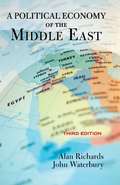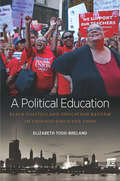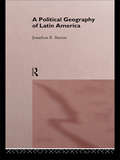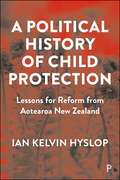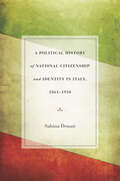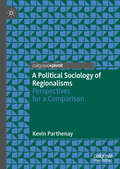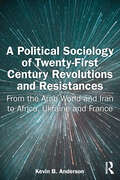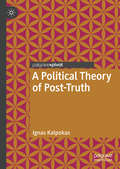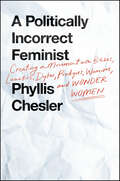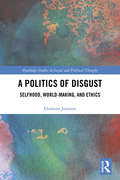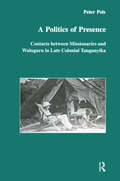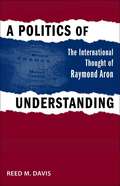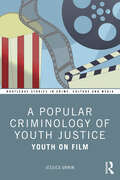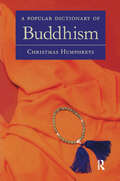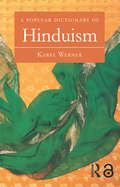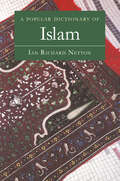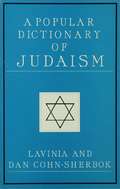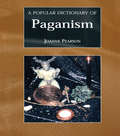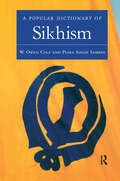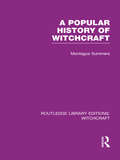- Table View
- List View
A Political Ecology of Youth and Crime
by Derrick Armstrong Dorothy Bottrell Alan FranceThis book explores young people's 'nested' and 'political' ecological relationships with crime through an empirical investigation of the important 'places' and 'spaces' in young people's lives; in their social relationships with peers and family members; and within formal institutional systems such as education, youth justice and social care.
A Political Economy of Arab Education: Policies and Comparative Perspectives (Routledge Studies in Middle Eastern Society)
by Mohamed Alaa Abdel-MoneimThe failure of reform policies in areas of critical importance to Arab populations such as health and education played a central role in igniting the Arab Awakening, yet this policy perspective has been largely absent from recent studies of the region. Arab regimes most reliant on repression to guarantee their survival were also those most vulnerable to mass politics. Where threats to regime survival have been limited, so have more meaningful reforms been possible, finding an alternative to political change through focusing on "soft policy" areas such as education. A Political Economy of Arab Education offers a comprehensive analysis of K-12 education systems in Arab countries, deepening understanding of their administrative structures and outcomes, and exploring how political considerations have impacted the ability of Arab regimes to engage in meaningful reform. Taking a unique comparative political economy perspective, it examines the reasons behind policy stagnation in Arab countries, addressing the effects of size, history and political stability on the design and implementation of policies and administrative structures. Its informed analysis and comparison of education systems provides new insight into Arab regimes and highlights factors pulling them towards either stagnation or reform. Examining the sustainability of reforms and establishing the benefits of engaging in meaningful change, this book sheds light on why some regimes survived the Arab Spring while others crumbled and formulates convincing predictions on the potential for future regime change in the region. This book will be of key interest to students and scholars of Middle Eastern Studies, International and Comparative Education and Development Studies.
A Political Economy of Forest Resource Use: Case Studies of Social Forestry in Bangladesh (Routledge Revivals)
by Niaz Ahmed KhanPublished in 1998. An International monograph publishing series covering new research into the ‘green’ issues such as government, corporate and public responses to environmental hazards, the economics of green policies and the effectiveness of environmental protection programmes.
A Political Economy of the Middle East
by John Waterbury Alan Richards Melani Cammett Ishac DiwanThis integrated, analytic text presents a comprehensive analysis transformation and development of the political economy in the Middle East over the past several decades. In this updated third edition of A Political Economy of the Middle East, the book retains its focus on the interaction of economic development processes, state systems, and social actors even as it also:*Documents the many changes in demography, education, labor markets, urbanization, water and agriculture, and international labor migration in the Middle East in recent years;*Considers the effect of rising oil prices on reinforcement of authoritarian governance in the region;*Refines its assessment of "the Washington Consensus" to provide a more nuanced approach to the issue of the shifting balance of state and market in economic growth and reform;*Presents Islamism as a vital force in the region that is nonetheless a vast, diverse social movement with many conflicting participants;*Explores the impact of the Arab Spring and subsequent events to the issues raised throughout the textbook in a wholly new chapter.
A Political Economy of the Middle East
by John Waterbury Alan RichardsThis integrated, analytic text presents a comprehensive analysis of the transformation of the political economy of development in the contemporary Middle East over the past several decades. Extensively rewritten and revised, the third edition of A Political Economy of the Middle East retains a focus on the interaction of economic development processes, state systems, and social actors even as it also: Documents the many changes in demography, education, labor markets, urbanization, water and agriculture, and international labor migration in the Middle East in recent years; Considers the effect of rising oil prices on reinforcement of authoritarian governance in the region; Refines its assessment of "the Washington Consensus” to provide a more nuanced approach to the issue of the shifting balance of state and market in economic growth and reform (in an entirely rewritten Chapter 9); Presents Islamism as a vital force in the region that is nonetheless a vast, diverse social movement with many conflicting participants (in a wholly revised Chapter 14).
A Political Education: Black Politics and Education Reform in Chicago since the 1960s (Justice, Power, and Politics)
by Elizabeth Todd-BrelandIn 2012, Chicago's school year began with the city's first teachers' strike in a quarter century and ended with the largest mass closure of public schools in U.S. history. On one side, a union leader and veteran black woman educator drew upon organizing strategies from black and Latinx communities to demand increased school resources. On the other side, the mayor, backed by the Obama administration, argued that only corporate-style education reform could set the struggling school system aright. The stark differences in positions resonated nationally, challenging the long-standing alliance between teachers' unions and the Democratic Party.Elizabeth Todd-Breland recovers the hidden history underlying this battle. She tells the story of black education reformers' community-based strategies to improve education beginning during the 1960s, as support for desegregation transformed into community control, experimental schooling models that pre-dated charter schools, and black teachers' challenges to a newly assertive teachers' union. This book reveals how these strategies collided with the burgeoning neoliberal educational apparatus during the late twentieth century, laying bare ruptures and enduring tensions between the politics of black achievement, urban inequality, and U.S. democracy.
A Political Geography of Latin America
by Jonathan R. BartonThe nation-states and peoples of South and Central America, Cuba, Haiti and the Dominican Republic, that together form the political geographical region of Latin America, encompass a wide range of societies, politics and economies. This text exposes the differences between places, regions and countries, individuals and societies, offering an invaluable insight into the themes of political and economic development, and provides a guide to understanding power and space relations. From the Antarctic to the tropical jungles, the coastal communities to the highland villages, the mega-cities to isolated rural existence, the political geographies of lives, localities, cities and rurality are too sophisticated to be subjected to generalizations. Adopting a critical human geography perspective, Jonathon Barton provides an understanding of similarities, difference and sophisticated human geographies.
A Political History of Child Protection: Lessons for Reform from Aotearoa New Zealand
by Ian Kelvin HyslopExploring the current and historical tensions between liberal capitalism and indigenous models of family life, Ian Kelvin Hyslop argues for a new model of child protection in Aotearoa New Zealand and other parts of the Anglophone world. He puts forward the case that child safety can only be sustainably advanced by policy initiatives which promote social and economic equality and from practice which takes meaningful account of the complex relationship between economic circumstances and the lived realities of service users.
A Political History of National Citizenship and Identity in Italy, 1861-1950
by Sabina DonatiThe fascinating origins and complex evolution of Italian national citizenship come alive in the pages of this rich history. Covering the period from the unification of Italy in 1861 through the early years following the Second World War, Sabina Donati explores the civic history of female and male Italians in the peninsula, Italy's immigrants and emigrants, and the country's colonial and overseas native populations. Donati makes extensive use of archival research and delves into the policies, debates, and formal notions of Italian national citizenship. Her narrative aims to grasp the multi-faceted, evolving, and often contested vision(s) of italianità that have developed in historical perspective and are discussed here in relation to alienhood, racial thinking, migration, expansionism, and gender. As a pioneering modem history of Italian citizenship, this work highlights often-overlooked precedents, continuities, and discontinuities within and between liberal and fascist Ital(ies). Ultimately, it seeks to contribute to citizenship and identity studies by comparing Italy with other European countries, fully bringing out the specificity of the Italian case in relation to French, British, and German citizenship traditions. Book jacket.
A Political Sociology of Regionalisms: Perspectives for a Comparison
by Kevin ParthenayThis book provides an alternative approach to regionalism in neglected parts of the world. Taking stock of several decades of conceptualization, the author provides a political sociology approach of regionalisms fed by recent contributions from the sociology of international relations and public policy analysis. It uses a methodological rather than theoretical framework to bring a new perspective on an emerging field of comparative regionalism. The relational dimensions, the social contexts and characteristics of actors and their practices are key to shed a new light on what is considered in this book as a ‘social international phenomenon’.
A Political Sociology of Twenty-First Century Revolutions and Resistances: From the Arab World and Iran to Africa, Ukraine and France
by Kevin AndersonThis book examines the possibilities – and realities – of positive, humanist change and revolution that have burst forth in the first decades of this century.Kevin B. Anderson critically examines the revolutions, uprisings, social movements, and forms of national resistance that have arisen across the Middle East and North Africa, Sudan, South Africa, Ukraine, and France in the past 15 years, providing a salient snapshot of geopolitical and social events in a way that is both timely and in-the-moment. The book represents an effort to analyze world events, especially revolutions and radical movements, in a dialectical manner, combining contemporary analysis of the class, gender, and ethnic dimensions of these upheavals with theoretical and historical reflection that engages Hegel, Marx, Lenin, Rosa Luxemburg, CLR James, Raya Dunayevskaya, and other thinkers in the Marxian tradition.A Political Sociology of Twenty-First Century Revolutions and Resistances is an important resource for researchers and current affairs opinion leaders, as well as a key text for courses in social change, political sociology, social movements, and contemporary social theory.
A Political Theory of Post-Truth
by Ignas KalpokasThis book combines political theory with media and communications studies in order to formulate a theory of post-truth, concentrating on the latter’s preconditions, context, and functions in today’s societies. Contrary to the prevalent view of post-truth as primarily manipulative, it is argued that post-truth is, instead, a collusion in which audiences willingly engage with aspirational narratives co-created with the communicators. Meanwhile, the broader meta-framework for post-truth is provided by mediatisation—increasing subjection of a variety of social spheres to media logic and the primacy of media in everyday human activities. Ultimately, post-truth is governed by collective efforts to maximise the pleasure of encountering the world and attempts to set hegemonic benchmarks for such pleasure.
A Politically Incorrect Feminist: Creating a Movement with Bitches, Lunatics, Dykes, Prodigies, Warriors, and Wonder Women
by Phyllis CheslerA powerful and revealing memoir about the pioneers of modern-day feminismPhyllis Chesler was a pioneer of Second Wave Feminism. Chesler and the women who came out swinging between 1972-1975 integrated the want ads, brought class action lawsuits on behalf of economic discrimination, opened rape crisis lines and shelters for battered women, held marches and sit-ins for abortion and equal rights, famously took over offices and buildings, and pioneered high profile Speak-outs. They began the first-ever national and international public conversations about birth control and abortion, sexual harassment, violence against women, female orgasm, and a woman’s right to kill in self-defense. Now, Chesler has juicy stories to tell. The feminist movement has changed over the years, but Chesler knew some of its first pioneers, including Gloria Steinem, Kate Millett, Flo Kennedy, and Andrea Dworkin. These women were fierce forces of nature, smoldering figures of sin and soul, rock stars and action heroes in real life. Some had been viewed as whores, witches, and madwomen, but were changing the world and becoming major players in history. In A Politically Incorrect Feminist, Chesler gets chatty while introducing the reader to some of feminism's major players and world-changers.
A Politics of Disgust: Selfhood, World-Making, and Ethics (Routledge Studies in Social and Political Thought)
by Eleonora JoensuuThis book explores the intersubjective nature of disgust, the fascination that often accompanies it—along with repulsion—and the ethical implications of the experience. With attention to what emotions do rather than what they necessarily are, it examines the ways in which disgust works to create structures of meaning about selfhood, interpersonal relationships, and the worlds we inhabit. Offering a critique of existing approaches to disgust, the author advances a feminist intersubjective perspective, drawing on the work of Jessica Benjamin to understand the relational aspects of disgust encounters. Thus, the focus is not on defining disgust definitively, nor debating what objects invoke disgust, nor on whether it is a universal experience, but on the effects of disgust once invoked, what the experience does and the impact it has. Through a case study of incarceration and death by self-inflicted strangulation—a death that was later ruled a homicide—this volume sheds light on the nature of the ethical demands of disgust and its nature as an active struggle for recognition. As such, A Politics of Disgust will appeal to scholars of gender studies, social theory and philosophy with interests in the emotions and intersubjectivity.
A Politics of Presence: Contacts Between Missionaries and Walugru in Late Colonial Tanganyika (Studies in Anthropology and History #Vol. 22)
by Peter PelsChristian missions in Africa are commonly viewed as a blatant example of ethnocentrism. This stereotype partly exists because the day-to-day interaction between missionaries and Africans has so rarely been studied. This book shows how Africans and missionaries co-produced a Catholic Church in the Uluguru mountains of Eastern Tanzania in the late colonial period, thereby adapting each others' routines in the fields of initiation, education, magic, and religion. It explores how the presence of the mission resulted in a rift between spiritual and worldly magic, and in the underdevelopment of the capacity of Waluguru to manage their own practices of revelation.
A Politics of Understanding: The International Thought of Raymond Aron (Political Traditions in Foreign Policy Series)
by Reed M. DavisFrequently hailed as one of the greatest defenders of democratic liberalism in postwar Europe, French philosopher, sociologist, and political commentator Raymond Aron (1905--1983) left behind a staggering amount of published work on a remarkably wide range of topics both scholarly and popular. In A Politics of Understanding, Reed M. Davis assesses the originality and consistency of Aron's body of work, drawing a connection between Aron's philosophy of history and three of his abiding interests: the nature of industrial society, international relations theory, and strategic theory.Davis begins with a brief biography of Aron, known for his skepticism toward political ideologies in the post--World War II era and as an intellectual opponent of Jean-Paul Sartre. After spending three years in Germany in the early 1930s, Aron, a Jew, returned to France in 1933. When war broke out, he fought for a year in the French army and, after the fall of France, escaped to London, where he edited the newspaper of the Free French, La France Libre. He returned to Paris after the war and remained there for the rest of his life, working as a professor and journalist. He wrote an influential political column for Le Figaro for thirty years and authored many books, including The Opium of the Intellectuals (1935), The Algerian Tragedy (1957), and Peace and War (1962).From World War II onward, Davis shows, Aron sought to construct a science of human action that had as its goal charting the way of human progress in light of two fundamental realities, industrialization and the existence of nuclear weapons. Throughout his long career, he continually asked himself whether human life was becoming better as it became more technologically rationalized and more scientifically advanced. In his close analysis of Aron's thought, Davis carefully describes how Aron fused Max Weber's neo-Kantianism with Edmund Husserl's phenomenology to create an original theory of historical knowledge. The central theoretical impulse in all of Aron's works, Davis explains, is that of reconciling freedom and necessity. The ways in which Aron attempted to reconcile these two polarities in his earliest writings had a direct bearing on the manner in which he sought to reconcile realism and idealism in his international thought. By attempting to bring reason and necessity into the same loose orbit, Aron tried to construct a theoretical approach to international relations and statecraft that could hold the middle ground between realism and idealism. Many scholars have simply abandoned efforts to understand the more philosophical dimensions of Aron's thinking because of its technical difficulty. With A Politics of Understanding, Davis provides a concise and clearly written explanation of the basic concepts at work in Aron's philosophy and ties them directly to his later thinking, especially concerning international relations.
A Popular Criminology of Youth Justice: Youth on Film (Routledge Studies in Crime, Culture and Media)
by Jessica UrwinAnalysing the representation of youth crime and justice-involved children in popular fictional films, this book explores how what we see on screen contributes to the perceptions of youth justice in society, policy, and practice.Putting forward the argument that fictional representations have a real-world impact on the opportunities available to children, each chapter in the book focuses on a different genre or type of film and considers the ways in which justice-involved children have been demonised, stereotyped, and harmed by their portrayal on the big screen. From James Dean and the birth of “monstrous youth” in Rebel Without A Cause to the current, more nuanced portrayals as seen in The Young Offenders, the book examines films throughout history and across different cultures. In doing so, it demonstrates how portrayals of justice-involved children have contributed to the social understanding of what youth crime is and who is to blame for it, and highlights how we can use this knowledge to better understand and support children.By combining youth justice theory with media analysis, A Popular Criminology of Youth Justice: Youth on Film makes a novel contribution to both fields and will be of great interest to students and researchers in the areas of youth crime, youth justice, and the media.
A Popular Dictionary of Buddhism
by Christmas HumphreysA dictionary and a glossary of terms plus brief biographies of eminent Buddhists and scholars from both East and West.
A Popular Dictionary of Hinduism
by Karel WernerA multi-purpose reference work which should become an indispensable companion for anybody who comes into touch with Hinduism. Includes a dictionary of Sanskrit and vernacular terms; a glossary of terms and concepts; and a survey of the historical development of Hinduism.
A Popular Dictionary of Islam
by Ian Richard NettonBoth a dictionary and a glossary of terms that attempts to cover the entire field of Islam. Also included are brief biographies of eminent Muslims and Islamic scholars throughout the ages, providing a ready reference to authorities normally cited.
A Popular Dictionary of Judaism (Popular Dictionaries Of Religion Ser.)
by Lavinia Cohn-Sherbok Dan Cohn-SherbokThis concise dictionary of Judaism contains over a thousand entries describing all the key aspects of religion, culture and history in the Jewish faith. Entries range from Aaron to Zugot via Abolition, Cherub, Documentary Hypothesis, Euthenasia, Falashas, and many other interesting and essential topics. This is not only a reference tool for those who want to know more about the tradition, but a practical guide to the current Jewish interpretation of topics of universal interest. Designed for the student as well as the general reader, it deserves a place in every library and every Jewish home.
A Popular Dictionary of Paganism (Popular Dictionaries Of Religion Ser.)
by Joanne PearsonThis dictionary provides a readily available collection of source material for a subject which has recently become of considerable public and academic interest. It provides a point of reference for key words and concepts which have previously been available only in short glossaries, footnotes, or within a body of text. It deals with concepts shared by all Pagans, and also with those concepts unique to a particular Pagan tradition.
A Popular Dictionary of Sikhism: Sikh Religion and Philosophy
by W. Owen Cole Piara Singh SambhiThe first to appear in Curzon's well respected 'Popular Dictionary' series.
A Popular Dictionary of Sikhism: Sikh Religion and Philosophy
by W. Owen Cole Piara Singh SambhiThe first to appear in Curzon's well respected 'Popular Dictionary' series.
A Popular History of Witchcraft: Montague Summers (Routledge Library Editions: Witchcraft)
by Montague SummersThis is a comprehensive guide to the practices of witchcraft from their inception to the present day. Summers argues that all witchcraft is essentially the same, regardless of geographical location. He examines the practices of the cult in great detail, and its historical progression, within the context of the 1736 Repeal Act of George II.
